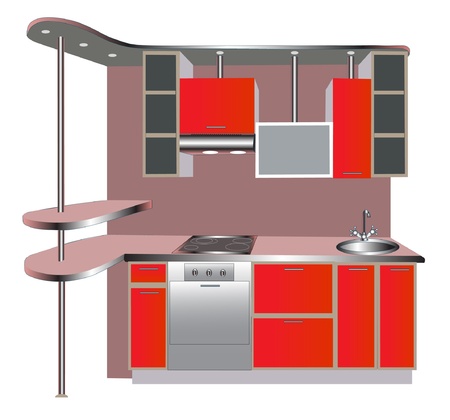1. Introduction to Smart Refrigerators
Smart refrigerators are revolutionizing modern kitchens by combining advanced technology with everyday convenience. Unlike traditional refrigerators, these high-tech appliances offer features that help you manage food storage, reduce waste, and even integrate with other smart home devices. Whether youre looking to streamline your grocery shopping or keep track of expiration dates, a smart refrigerator can make your kitchen experience smoother and more efficient.
The Evolution of Smart Refrigerators
Over the years, refrigerators have evolved from simple cooling units to intelligent kitchen assistants. Early models focused solely on preserving food, but todays smart refrigerators come equipped with Wi-Fi connectivity, touchscreens, and even voice control. These innovations allow users to check the contents of their fridge remotely, receive automatic grocery lists, and set reminders for expiration dates.
The Role of Smart Refrigerators in Modern Kitchens
Smart refrigerators play an essential role in creating a connected and efficient kitchen. They help households reduce food waste, improve meal planning, and enhance overall convenience. Some models even include built-in cameras that let you see inside your fridge from anywhere using a smartphone app. Additionally, integration with virtual assistants like Amazon Alexa and Google Assistant allows for hands-free operation.
Key Features of Smart Refrigerators
| Feature | Benefit |
|---|---|
| Wi-Fi Connectivity | Allows remote access and control via smartphone apps |
| Touchscreen Display | Makes it easy to manage grocery lists and recipes |
| Internal Cameras | Lets you check fridge contents without opening the door |
| Voice Control | Enables hands-free operation through virtual assistants |
| Smart Temperature Control | Keeps food fresher for longer by adjusting settings automatically |
Why Smart Refrigerators Are Worth Considering
If youre looking to upgrade your kitchen with modern technology, a smart refrigerator is a great investment. It not only enhances convenience but also helps you save time and money by optimizing food management. As these appliances continue to evolve, they are becoming an essential part of the smart home ecosystem.
2. Key Features of Smart Refrigerators
Smart refrigerators come with a variety of advanced features that make your kitchen more efficient and convenient. From touchscreen displays to Wi-Fi connectivity, these appliances are designed to enhance your daily routine. Below, we explore some of the key features that set smart refrigerators apart.
Touchscreen Displays
Many smart refrigerators feature built-in touchscreen displays that serve as a control center for various functions. You can use them to check the weather, display calendars, create grocery lists, or even watch videos while cooking. Some models also allow you to leave digital notes for family members.
Wi-Fi Connectivity
With Wi-Fi connectivity, smart refrigerators can sync with your smartphone or other smart home devices. This allows you to monitor and control settings remotely, receive maintenance alerts, and even get recipe recommendations based on the ingredients inside your fridge.
Internal Cameras
One of the most useful features of a smart refrigerator is the internal camera system. These cameras let you check whats inside your fridge from anywhere using a mobile app. This is especially helpful when youre at the grocery store and need to see what items youre running low on.
Energy Efficiency
Smart refrigerators are designed with energy efficiency in mind. Many models come with sensors that adjust cooling levels based on usage patterns, helping to reduce electricity consumption. Some also provide real-time energy usage reports so you can track and optimize your power consumption.
Comparison of Key Features
| Feature | Description |
|---|---|
| Touchscreen Display | Allows users to manage grocery lists, calendars, and entertainment directly from the fridge. |
| Wi-Fi Connectivity | Enables remote monitoring and control via a smartphone app. |
| Internal Cameras | Lets users check fridge contents remotely through a mobile app. |
| Energy Efficiency | Sensors adjust cooling settings to reduce energy consumption. |

3. Benefits of Smart Refrigerators
Smart refrigerators offer a range of benefits that go beyond just keeping your food cold. They enhance convenience, help reduce food waste, and improve energy efficiency, making them a great addition to any modern kitchen.
Enhanced Convenience
One of the biggest advantages of smart refrigerators is their ability to make daily life easier. With features like touchscreens, voice control, and app connectivity, managing your groceries and meal planning becomes effortless.
Key Convenience Features:
| Feature | How It Helps |
|---|---|
| Wi-Fi Connectivity | Allows you to check fridge contents remotely via smartphone apps. |
| Voice Control | Compatible with virtual assistants like Alexa or Google Assistant for hands-free operation. |
| Built-in Cameras | Lets you see inside your fridge from anywhere to avoid unnecessary purchases. |
| Shopping List Integration | Keeps track of groceries and automatically updates shopping lists. |
Reducing Food Waste
Smart refrigerators help minimize food waste by keeping track of expiration dates and sending reminders when items are about to spoil. Some models even suggest recipes based on the ingredients you have, ensuring that nothing goes to waste.
Ways Smart Refrigerators Reduce Waste:
- Expiration Date Tracking: Keeps a log of stored food and alerts you before items go bad.
- Recipe Suggestions: Uses AI to recommend meals based on available ingredients.
- Crisper Drawer Controls: Adjusts humidity levels to keep fruits and vegetables fresh longer.
- Sensors & Alerts: Notifies you if the fridge door is left open, preventing spoilage.
Improving Energy Efficiency
A smart refrigerator can help lower electricity bills by optimizing energy use. Many models come with energy-saving modes and adaptive cooling technology that adjusts temperature settings based on usage patterns.
Energy-Saving Features:
- Adaptive Cooling: Adjusts temperature settings depending on how often the fridge is opened.
- Power Consumption Monitoring: Provides insights into energy usage and suggests ways to save power.
- ECO Mode: Reduces power consumption during low-usage periods.
- Tight Seals & Insulation: Prevents cold air from escaping, reducing strain on the compressor.
The combination of convenience, reduced food waste, and improved energy efficiency makes smart refrigerators a valuable investment for any home. These innovative appliances not only simplify daily tasks but also contribute to a more sustainable lifestyle.
4. Integration with Smart Home Ecosystems
Smart refrigerators are more than just high-tech appliances; they seamlessly integrate with your smart home ecosystem, making daily tasks easier and more efficient. These refrigerators can connect with voice assistants, smartphones, and home automation systems, allowing you to control and monitor them remotely.
Connecting with Voice Assistants
Many smart refrigerators are compatible with popular voice assistants like Amazon Alexa and Google Assistant. This means you can use voice commands to check the temperature, add items to your shopping list, or even find recipes based on the ingredients in your fridge.
Smartphone Connectivity
With smartphone apps designed for smart refrigerators, you can manage your fridge from anywhere. Whether youre at the grocery store or on vacation, you can:
- Check what’s inside your fridge through built-in cameras.
- Receive notifications if the door is left open.
- Adjust temperature settings remotely.
- Create shopping lists that sync with your phone.
Home Automation System Integration
Smart refrigerators can also work with broader home automation systems. They can sync with other smart devices to enhance convenience and energy efficiency. For example:
| Feature | Benefit |
|---|---|
| Syncing with Smart Thermostats | The refrigerator can optimize its cooling based on home temperature settings. |
| Connecting with Smart Lights | The fridge light can turn on when it detects motion nearby. |
| Integration with Grocery Delivery Services | You can reorder groceries directly through the fridge’s interface. |
The Future of Smart Kitchen Connectivity
As technology advances, smart refrigerators will continue to evolve, offering even deeper integration with other smart home devices. From automated meal planning to AI-driven food management, these innovations will make kitchens more intelligent and user-friendly.
5. Choosing the Right Smart Refrigerator
Selecting the perfect smart refrigerator for your kitchen involves considering several important factors. From size and features to budget, making the right choice ensures that your new appliance fits seamlessly into your lifestyle.
Size Matters: Finding the Right Fit
Before purchasing a smart refrigerator, measure the available space in your kitchen. Consider the width, height, and depth of the area where the fridge will be placed, ensuring there is enough clearance for doors to open fully. Below is a general size guide:
| Refrigerator Type | Typical Width | Typical Height | Best For |
|---|---|---|---|
| Top Freezer | 28-32 inches | 61-66 inches | Small kitchens, budget-friendly options |
| Bottom Freezer | 29-33 inches | 67-70 inches | Easier access to fresh food, family use |
| French Door | 30-36 inches | 68-70 inches | Larger families, spacious storage |
| Side-by-Side | 32-39 inches | 65-71 inches | Narrow door clearance, organized storage |
| Counter-Depth | Around 36 inches | Around 70 inches | Sleek design, built-in look |
Key Features to Look For
The latest smart refrigerators come with a variety of features that enhance convenience and efficiency. Here are some of the most useful ones:
Wi-Fi Connectivity:
Allows you to control settings and monitor usage through a smartphone app.
Touchscreen Displays:
Provides access to calendars, grocery lists, and even streaming services.
Voice Control Integration:
Works with Alexa or Google Assistant for hands-free operation.
Internal Cameras:
Lets you check fridge contents remotely while grocery shopping.
Temperature Zones:
Different compartments allow customized cooling for various foods.
Energy Efficiency:
Helps reduce power consumption and lower utility bills.
Door Alerts:
Sends notifications if the fridge door is left open.
Water & Ice Dispenser:
Conveniently provides filtered water and ice cubes on demand.
Your Budget: Finding the Best Value
The price of smart refrigerators varies widely depending on brand, features, and size. Here’s a rough price breakdown to help you set your budget:
| Price Range | Main Features Included | Suits Best For |
|---|---|---|
| $1,000 – $1,500 | Basic smart features like Wi-Fi connectivity and app control. | Bargain shoppers looking for essential tech upgrades. |
| $1,500 – $2,500 | Adds touchscreen displays, voice control, and internal cameras. | A balance of affordability and advanced features. |
| $2,500 – $5,000+ | Packed with premium finishes, larger capacity, and AI-driven features. | Larger households or those wanting cutting-edge technology. |
Narrowing Down Your Options
The best way to find the right smart refrigerator is to consider your daily habits. If you frequently entertain guests or have a large family, a French door model with ample storage might be ideal. If you prefer a minimalist look, a counter-depth model could be a better fit. Compare different brands and read customer reviews before making your final decision.
No matter which model you choose, investing in a smart refrigerator can make your kitchen more efficient and connected than ever before.
Future Trends in Smart Refrigeration
Smart refrigerators are continuously evolving, incorporating new technologies that enhance convenience, efficiency, and kitchen aesthetics. As technology advances, these appliances are becoming more intelligent, energy-efficient, and seamlessly integrated into modern kitchens. Lets take a look at some upcoming innovations in smart refrigeration and how they will impact kitchen design.
AI-Powered Food Management
Future smart refrigerators will feature advanced artificial intelligence (AI) to help manage food inventory more efficiently. These systems will not only track expiration dates but also suggest recipes based on available ingredients. Some models may even integrate with grocery delivery services to automatically reorder essentials when supplies run low.
Energy Efficiency and Sustainability
As sustainability becomes a priority, smart refrigerators will incorporate more eco-friendly features. Manufacturers are developing models with improved insulation, energy-saving cooling systems, and eco-friendly refrigerants to reduce environmental impact.
| Feature | Benefit |
|---|---|
| Advanced Insulation | Keeps food fresh longer while reducing energy consumption |
| Eco-Friendly Refrigerants | Lowers environmental impact by using sustainable cooling agents |
| Smart Energy Monitoring | Helps users optimize power usage and lower electricity bills |
Seamless Kitchen Integration
The future of smart refrigeration is all about integration. Newer models will connect effortlessly with other smart home devices, allowing voice commands and remote control via smartphones. They will also feature customizable panels that blend seamlessly with kitchen cabinetry for a sleek, modern look.
Health-Focused Innovations
An emerging trend in smart refrigeration is the focus on health-conscious living. Future models may include built-in water filtration systems, air purifiers to maintain optimal freshness, and compartments designed specifically for organic produce storage.
The Evolution of Touchless Controls
The post-pandemic world has increased demand for touchless technology. Expect to see refrigerators with motion sensors, voice activation, and even facial recognition to open doors without physical contact—enhancing hygiene while offering ultimate convenience.


